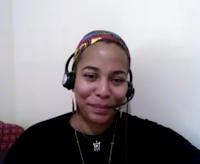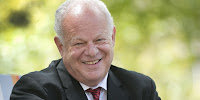Since narcissists lack a core identity or personality,
they can change ideology and alliances overnight and without rhyme or reason.
They tend to align themselves with people who always say yes to them and who constantly
and unconditionally applaud their ideas, no matter how detrimental, half-baked,
or implausible they may be. At the same time, narcissists tend to shun and
eliminate anyone that opposes their plans and ideas regardless of whether the
criticism is constructive and the intentions behind them noble and
well-meaning. In fact, for a narcissist, there is no such thing as constructive
criticism; they see any criticism as a veiled and ultimately threatening
personal attack on their very existence.
A narcissist’s worldview is simple and naïve and
consists of black and white palettes only: You are either with them or against them. As they lack imagination and feeling and a sense of humor, they only see
and evaluate everything in terms of how it benefits them personally at the
moment, while they lack ethics and empathy throughout. Everything needs to be
about them, and everybody should hold them up as a shiny role model by sustaining
them on a pedestal. Trump sees himself as the king of the world, whereas
Princess Diana saw herself as the world’s princess.
Finally, narcissists are highly adept at manipulating
and controlling others. They may play the victim or the savior card at will,
and occasionally they even put down both at the same time. They are good at making you believe that they are on your side and that they embrace, champion, and fight for your cause, but, in fact, this is far from the truth.
They are not the projected and purported shiny examples nor the voice of the people; in fact, all their actions are void of
feeling and resonance and their only purpose is to impress others and earn
people’s praise as they want to show the world how allegedly wonderful beings
they are. I am still shocked that many still believe that Trump has their backs
covered and that many still think that Diana was benevolent and caring, but
sadly, both aspects and each tale are far from the truth.
Trump’s Tale of Lies and Manipulation
It is ironic (but not surprising) that from the first
day of taking office, Trump has attacked what he deemed and promoted as “fake
news” by virulently propagating his own so-called alternative view and version
of facts and events. I remember that we all knew we were in for a bumpy ride
when the then Press Secretary Sean Spicer tried to convince us against facts,
evidence and not to say common sense that Trump’s inauguration excelled in
attendance and popularity.
Two things that mark narcissists are their competitive
streak with others and their desire to be - or rather be perceived as - the all-time best. Unlike people who
strive for success and put in the extra hour of work and effort, the narcissist
can often not be bothered. They expect everything to come to them quickly,
handily, and effortlessly as they have an unusually high sense of personal entitlement.
Just like their namesake mythological figure Narcissus, they are utterly and
blindly in love with themselves, their image, personality, and their supposed and
often imagined talents and accomplishments.
Competition looms large but again it is only driven by their desire to be perceived as the best of the lot. No matter what skill or event you talk about, they think they are always better and a step ahead of the rest of us. The actual accomplishments play only second fiddle. One of the main driving forces for Trump - apart from escaping financial ruin, cementing and fortifying his ailing business endeavors as well as escaping the law for tax evasion and malpractice - was his competitive streak with Obama.
Trump was utterly envious of the success and popularity of the
first African American president. Trump’s blatant and unapologetic racism
alongside his espousal of racist ideology, groups and actions were undertaken
for his own benefit but to also undermine all and any of Obama’s achievement
and endeavors; yet, personal vendetta and agenda aside, Trump
appears to feel most comfortable in the white-supremacist mindset and the fascist mold.
Narcissists feel they are in competition with everyone
else simply because they want to be perceived as the best at everything that
they set their minds on. It does not matter whether they have the necessary
skills and qualifications. This is also the main reason why everything is in
superlatives when Trump talks about himself, while even the greatest
accomplishments of others are denigrated, brushed off, and symbolize nothing to
him.
In fact, narcissists are so out of touch with reality
and common sense that they could see everyone as potential threats, including
their own children and family members. For instance, it is not unusual nor out
of place for a narcissistic mother to want to seduce and steal her daughter’s
boyfriend. Age, beauty, and simple decency are no hindrance to their
unfiltered desires.
Yet as long as you are in their good books and
unquestioningly obey, adulate and praise them, harm shall not fall upon you for the time being and
you may be even promoted. The moment you criticize them, no matter how minor,
reasonable, or constructive the criticism may be, the tables will turn all of a
sudden, and in the blink of an eye, you will be given the boot, no matter how
loyal, devoted and dedicated you have been to the narcissist. This has been
clearly exemplified by uncountable turnovers in his administration.
Why do they handle criticism so badly? It is because
they try to delude themselves on a daily basis that they are special, important, and intelligent when in reality, deep inside, they are - albeit dimly and
subconsciously - aware that this is simply not true. Hence, instead of facing
reality, they build a fortress of lies and make-believe in which facts are
alternative and malleable and in which they are always right no matter how
wrong they may be. Any potential doubt must be squashed to keep their illusions
as real as possible and they do not hesitate to lash out at others.
If others criticize them, they are simply wrong. If
the media disagrees with them, the news networks are the enemy of the people
and their reports are completely baseless and misguided. People, journalists, and news
networks that praise his outlandish and fantastical ideas are embraced, praised,
and promoted by Trump. The truth has been thrown under the bus and instead,
praise and idolatry are what matter most to Trump. It comes as no surprise that
most dictators have been narcissists as they can have their way anyway they
wish and can liberally impose punishments and even death upon all the souls that raise their
voices in dissent.
One of the main problems of narcissists is that they
have no core self. And with that, they are empty and void. Apart from an
absence of empathy or any type of healthy feeling, they also lack ideals,
values, and originality. Trump has always seen himself as a product to market to
others. He is not intelligent but smart and knows how to manipulate and
influence people. At some point, he may have contemplated running as a Democrat,
but he found it easier and more convenient to run as a Republican.
Soon enough, he found his niche, and he tapped into
what it was that the majority of the people responded to and resonated with. He was
a product in the making and he would receive immediate feedback through his campaign
rallies. If the slogans and chants were well received, he would usurp them and develop
and build on them. It could be anywhere from Build the Wall to Lock
her up. One of his catchiest and most promising ones, that of draining the
swamp was also his emptiest of slogans as he merely filled the so-called swamp with his own brand
of corrupt officials. The issues and actions may or may not have resonated with
him personally, but they certainly worked charms for him alongside Reagan’s borrowed
phrase of making America great again.
This also explains his overall lack of being
steadfast and committed to causes. Trump would switch opinions at a whim without
remorse or explanation. In his case, it does not help that he is astrologically
speaking a Gemini who are, even in the best and healthiest of cases, known for
having two faces and two personalities. He may be kind to his friends and
family members but harsh and demanding with his staff; yet, in the end, neither
part of that persona is his true essence as he lacks any core or essence, to
speak of.
Trump is nothing but his own distorted projections, and he
has lived in an alternate universe all his life. In his universe, his electoral
win was a landslide, but the same number of electoral seats of his opponent suddenly
turns into an election too close to call. In fact, since the results are not to his liking,
he puts the whole election process and democracy into doubt to serve his own
megalomaniacal benefits.
The sad aspect is that his followers have fallen for what they erroneously believe he actually stands for and they are in many ways as lost and deluded as he is. In fact, Trump only cares about himself, and absolutely no one else. For instance, he politicized the virus for his own gains and benefits regardless of the countless lives that have been lost in the process.
He is the worst type of narcissist, the psychopathic one that thinks of his own benefits at the expense of everything and everyone else. And yet, he still has many followers out there who are voting and rooting for him even though he does not give a damn about them; Trump would sacrifice all of them in a heartbeat. He has built an army of sycophants around himself and has done long-lasting harm and damage to his political group of choice, the Republican party with its constituents.
You can find Part 2 here: Diana's Tale of the World's Most Photographed Woman






